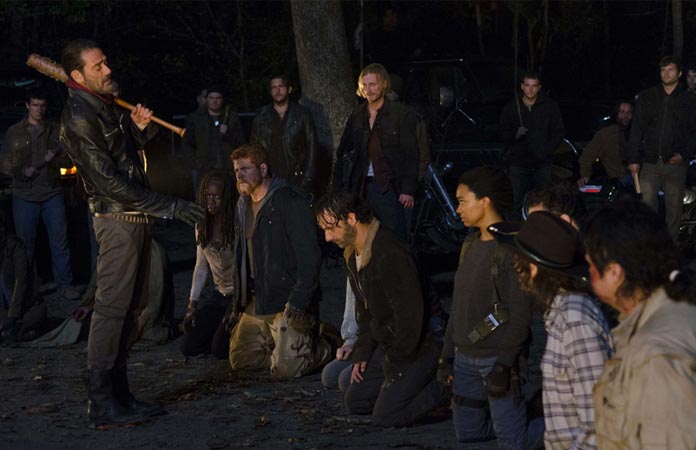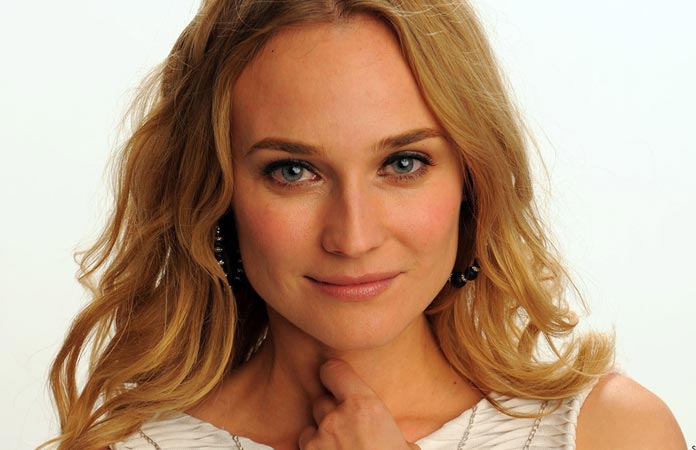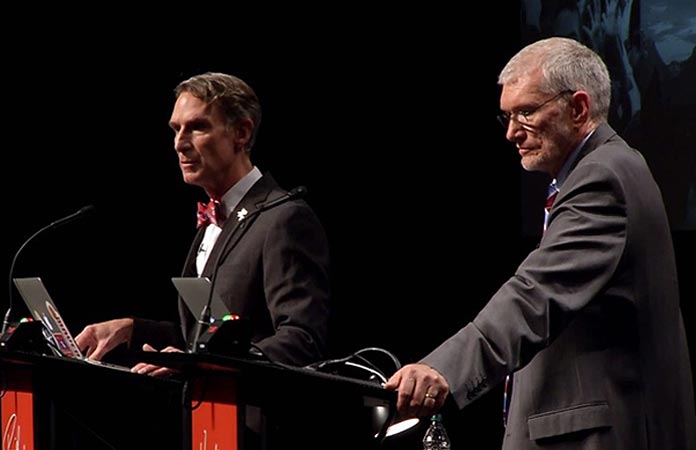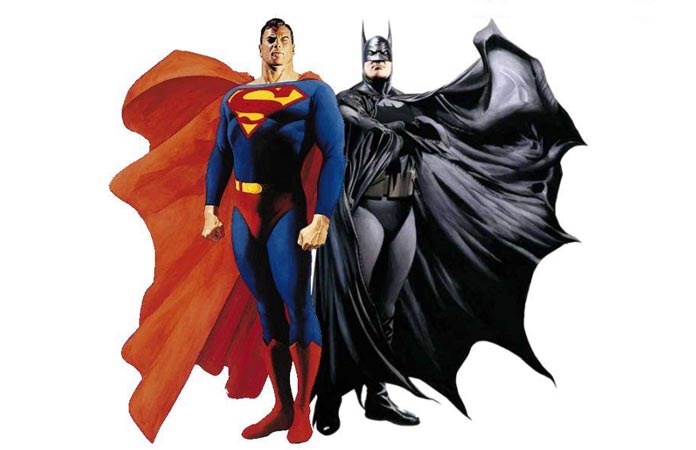The Trouble With Hawkeye
Published on May 6th, 2016 in: Action Movies, Comics, Movies, Over the Gadfly's Nest |By Christine Makepeace

It’s looming on the horizon. Civil War is hanging in the distance–hovering and swollen with promise. But potential disenchantment floats beside it like flotsam skimming the waves. The last time Marvel assembled its mightiest, it wasn’t so, well, mighty.
Why The Walking Dead Still Has Me Hooked
Published on April 8th, 2016 in: Horror, Over the Gadfly's Nest, Reviews, TV, TV Reviews |
I just spent the last 90 minutes watching The Walking Dead‘s Season 6 finale. To say that I am shocked would be a complete understatement. We’ve spent the entirety of the second half of this season awaiting the arrival of the notorious Negan, with hints of who this man is and why we should fear him and fear for our most beloved characters should they come face to face with him. A cliffhanger was not unexpected, but the acting in this episode? Some of the best, most realistic, and visceral I have ever seen from a television show.
Movie Review: Batman v Superman: Dawn Of Justice
Published on April 4th, 2016 in: Action Movies, Comics, Current Faves, Movie Reviews, Movies, Over the Gadfly's Nest, Reviews |By Tim Murr

One week after its release and Batman v Superman: Dawn of Justice is still creating controversy and dividing fans. It’s also doing something I don’t recall ever seeing before: the critics have made themselves and their personal experiences the story, rather than the movie. For a film that is so successful at the box office, there’s a high level of blind vitriol being leveled at it by so many critics from the blog-o-sphere to mainstream outlets. And yet fans are loving it and it made $500 million its opening weekend. BvS is rated at 29% on Rotten Tomatoes and 7.3/10 on IMDB. How can there be that wide of a disparity? And how can fans and critics be so divided?
WARNING: SPOILERS
Why the Star Wars Prequels Aren’t THAT Bad
Published on January 12th, 2016 in: Movies, Over the Gadfly's Nest |By Tyler Hodg
Star Wars: two short words that mean a great deal to a lot of people.
Yet, until December of 2015, half of the series was generally panned by fans and critics alike. How can something be so beloved and despised at the same time?
Pop Science: In Case You Didn’t Feel Like Showing Up, Top Arguments In Bill Nye’s Science vs. Creationism Debate
Published on February 28th, 2014 in: Over the Gadfly's Nest, Science and Technology |By Jesse Greener
The overwhelming consensus by scientists is that the Earth is experiencing human induced global warming, and there is strong evidence pointing out that the sixth mass extinction on the Earth is underway. Yet somehow, there is disbelief about the measurable fact that temperatures are rising and weather patterns are changing, not to mention disbelief that humans have anything to do with it.
On the leading edge of this kind of denial are the 46 percent of Americans who believe in creationism. We are talking about believing that the Bible is literally correct. This means accepting that the Universe is 6,000 years old, that the Ark was actually built by Noah and his family (from which all terrestrial life on Earth traces its origins), and Adam and Eve and the whole nine yards. Leading this crusade, if I may, is Ken Ham, curator of the Creationism Museum. You may remember Ham and his museum which were featured previously in Bill Maher’s documentary Religulous. (You can watch the entire movie if you get bored with this review)
Earlier this month, Bill Nye “The Science Guy” traveled to Ham’s home turf in Petersburg, Kentucky to debate. You can read play-by-play reviews of the debate and you can even watch the whole thing yourself. (Warning, it’s two hours plus in length.) Reviews were mixed. On the one hand, Nye was condemned for giving creationists a platform, whereas others such as Phil Plait thought it was high time that the “educated masses” recognized that creationism and its anti-science foundations need to be taken seriously and confronted.
Why Ben Affleck As Batman Doesn’t Matter
Published on August 24th, 2013 in: Comics, Movies, Over the Gadfly's Nest |By Paul Casey
Ben Affleck is Batman. Commence some teeth gnashing about how he lacks the essential nature of the character, followed by oppositionist chatter in favor. Here’s the thing, though: it doesn’t matter one bit who you cast in this Superman/Batman crossover. You can have Michael Keaton return to play an elderly and run down Frank Miller-style Bruce Wayne, or convince Christian Bale to lose all of his sense and diminish the great work he did with Christopher Nolan. You can give George Clooney another shot unhampered by a bad movie, or you can agree that Michael Fassbender is amazing in everything and just hire him. Superman/Batman remains an inherently bad idea, regardless of how it is executed and there are decades worth of comic books that confirm it.
Random Rant: No, Being Average Isn’t Worse Than Being Bad
Published on July 31st, 2013 in: Critics/Criticism, Gaming, Music, Over the Gadfly's Nest |By Paul Casey
If you have been reading music publications for any length of time, you will be familiar with the following:
“Much like the worst direction you can go in is no direction, so is inoffensiveness worse than taking a stand, and thus the boring album is in a way worse than even a terrible album. An album that is full-on awful will always get minimal scores, but an album that is accomplished but boring is going to attract the dreaded three-star review—so often the calling card of the most inessential music of all (if your album is best described as “pleasant” then you’re in serious trouble). A one-star album can’t be boring, because even if the music is godawful, it’s WHY it’s awful that is itself entertaining—a one-star review is inherently entertainment, which is why you’ll always read one when you’re skimming the reviews column. But who the hell wants to read the three-star reviews, particularly as they’re all identical (“IT’S NOT TERRIBLE, BUT IT’S LACKING. IT FALLS SHORT, BUT IS A STEP IN THE RIGHT DIRECTION”). And boring as fuck.
The opposite of enjoyment is not disgust; it’s tedium, because in a life so cruelly short, there’s nothing worse than being forgettable. The most disgusting pizza I’ve ever had was the one that accidentally had dish soap in it (SECRET FAMILY RECIPE), yet of all the ones I’ve eaten, it alone has survived the years as an amusing anecdote. It’s the middling three-star stuff you won’t remember. The albums from artists you respect that you’ve had forever but played once (REM are like your parents—you know they’re good, but you never listen to them). A reworking of ratings systems might help, but if we’ve gone this far without rating entertainment based on how entertaining it is, then why start now? The accepted method of rating albums isn’t terrible, of course, it’s just lacking. It falls short, but it’s a step in the right direction. I’d give it . . . 3 stars out of 5, let’s say.”
—”The 5 Worst Kinds of Album Every Music Fan Has Bought,” Cracked
In Defense Of: The Wicker Man (2006)
Published on July 25th, 2013 in: Movie Reviews, Movies, Over the Gadfly's Nest, Reviews, Underground/Cult |Joyous news coming out of England . . . no, not the Royal Baby. We’ll finally be getting a definitive final cut of Robin Hardy’s classic thriller, The Wicker Man, this fall. This is the best Samhain treat fans of the Man could have ever hoped for. Restored footage, digital remastering, the whole nine yards. Hopefully, once the disc hits North American shores, the film will garner a new following. When most Americans think of The Wicker Man, their first thought is the Nicolas Cage movie. Fans of the original film bristle at this, especially because the remake was so thoroughly mocked and maligned, as if the presence of Nicolas Cage gives the entire story a bad name.
I implore you to reconsider.
Assemblog: July 12, 2013
Published on July 12th, 2013 in: Assemblog, Feminism, Film Festivals, Horror, Movies, Music, Over the Gadfly's Nest, Trailers, Video |New this week on Popshifter: Paul has some surprising but apt suggestions in his two-part series on Horror Movies For Kids; Melissa loves bands with tuba players and as a result, raves about That’s It! from the Preservation Hall Jazz Band; Jeff will crack you up with his review of the probably unnecessary Thank You from Duran Duran; Chelsea enjoyed the “irresistible prose” and vast wealth of stories in Curtis Harrington’s memoir Nice Guys Don’t Work In Hollywood; I strongly recommend Desperation, the latest album from the Oblivians and share my thoughts (and a couple of photos) from last week’s IO Echo/CSS show at The Mod Club.
Feminism, Sexism, and Mocktresses: The Hollywood Reporter Gets Ugly
Published on March 14th, 2013 in: Feminism, Movies, Over the Gadfly's Nest |
Diane Kruger
The Hollywood Reporter is certainly not against whoring themselves out for fashion-focused red-carpet coverage. So this repulsive mixture of irony and condescending sexism in their piece about the rise of the “mocktress”—the new version of the model-actress—makes my blood boil. Fashion blogger Merle Ginsberg calls out Jessica Alba, Kate Bosworth, Diane Kruger, and others for being superficial, status-grabbing, money-grubbing paper dolls. Some choice quotes:
Yet she might not have done a project in years, and if she has, well, you haven’t heard of it. Still, she is a legitimate actress, having starred in a few rom-coms, action flicks or horror films, looking gorgeous in all of them. No fake noses or weight gain for this girl.
Today, said actress spends the majority of her time modeling on arrival lines as opposed to runways. Remember when models just wanted to be actresses? These days, a certain lanky, large-eyed genre of B-list-and-lower actresses have, for all intents and purposes, added “model” to their business-savvy hyphenate titles.
Alba alone attended about 43 events in 2012—the old “opening of an envelope” line comes to mind—and for tres chic Diane Kruger, it was 31 events. Kruger is becoming better known for being well-dressed than her occasional yet interesting acting choices. No doubt she makes more money that way.
I scarcely know where to begin. Rom-coms, action flicks, and horror films are not “real movies” according to Ginsberg and even if they were, they don’t count if you “haven’t heard of them.”
Apparently Ms. Ginsberg has private investigators following the “mocktresses” around because she clearly knows what they “spend the majority of their time” doing: “modeling.” Never mind that Alba has had a couple of kids in the last few years and has done a fair bit of charity work. Never mind that actresses, no matter how beautiful, typically get offered less interesting or rewarding scripts than their male counterparts. Diane Kruger is basically accused of selling herself out for money and clothes in lieu of a “real job.”
It doesn’t help that the article also mentions those celebrities who monetize their exploits or their rich and famous status to gain more riches and fame (Kim Kardashian); those still-valid criticisms feel tacked on. The damage is already done. Read the whole thing if you think you can stomach it.





